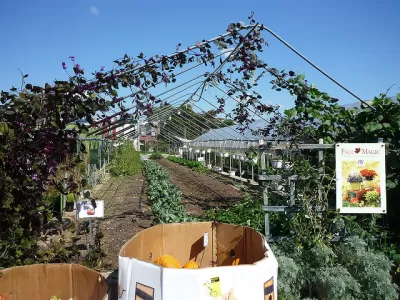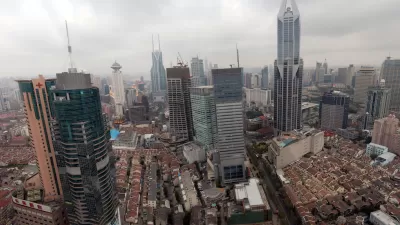For the first time, the state of Minnesota is offering money specifically for urban agriculture, in a win for urban farmers who want to challenge the notion that agriculture is necessarily a rural enterprise.

Though relatively modest, Minnesota's new urban agriculture grants may nurture a change in perceptions. Taryn Phaneuf writes, "Advocates said state investment is crucial because it lends credibility to what [one grant recipient] calls the 'changing face of agriculture.' Such state funding, even a small amount, can usher in a shift toward seeing urban areas as potential farms and their residents as fellow food producers."
The legislation that established the new grants took several years to get passed, primarily though the efforts of bill author Karen Clark (DFL-Minneapolis). Grants total $10 million a year, and they're funded through Minnesota's Agricultural Growth, Research, and Innovation program (known as AGRI), which supports agriculture and renewable energy in the state.
While the grants are only guaranteed through next year, advocates hope urban agriculture will retain its seat at the state table. Phaneuf elaborates: "A local food system – which includes everything from growing food to processing it to buying and consuming it – also creates jobs, income, and infrastructure. That’s the mindset used to justify public spending on agriculture development in Greater Minnesota, like one that helps farmers modernize their livestock operations by, say, expanding their facilities to hold more animals."
FULL STORY: State grant program offers money, and legitimacy, for urban agriculture

Alabama: Trump Terminates Settlements for Black Communities Harmed By Raw Sewage
Trump deemed the landmark civil rights agreement “illegal DEI and environmental justice policy.”

Study: Maui’s Plan to Convert Vacation Rentals to Long-Term Housing Could Cause Nearly $1 Billion Economic Loss
The plan would reduce visitor accommodation by 25% resulting in 1,900 jobs lost.

Why Should We Subsidize Public Transportation?
Many public transit agencies face financial stress due to rising costs, declining fare revenue, and declining subsidies. Transit advocates must provide a strong business case for increasing public transit funding.

Wind Energy on the Rise Despite Federal Policy Reversal
The Trump administration is revoking federal support for renewable energy, but demand for new projects continues unabated.

Passengers Flock to Caltrain After Electrification
The new electric trains are running faster and more reliably, leading to strong ridership growth on the Bay Area rail system.

Texas Churches Rally Behind ‘Yes in God’s Back Yard’ Legislation
Religious leaders want the state to reduce zoning regulations to streamline leasing church-owned land to housing developers.
Urban Design for Planners 1: Software Tools
This six-course series explores essential urban design concepts using open source software and equips planners with the tools they need to participate fully in the urban design process.
Planning for Universal Design
Learn the tools for implementing Universal Design in planning regulations.
Caltrans
Smith Gee Studio
Institute for Housing and Urban Development Studies (IHS)
City of Grandview
Harvard GSD Executive Education
Toledo-Lucas County Plan Commissions
Salt Lake City
NYU Wagner Graduate School of Public Service




























